China Easter 3. Beijing
The third game of my China trip was relatively straight forward. I spent the morning walking around Nanjing. Far too little time to do the city justice.
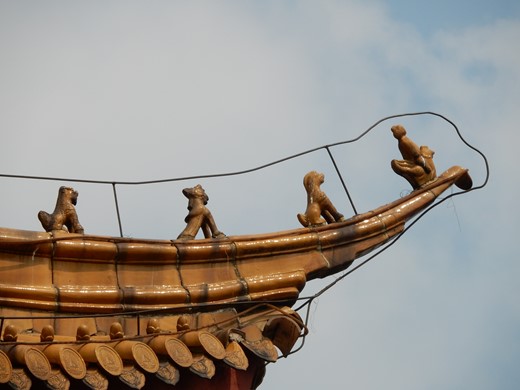
One day, someone will explain to me. Why do the roofs of Chinese Buddhist have a cavalcade of animals, always led by a man riding a chicken?
After that, it was the return journey back to Beijing, with the train again running late, but not so badly as the outward trip.
I had then spent about an hour navigating the metro to Olympic Sports Centre station
Alighting through the wrong exit (for my purpose), I was presented with a wide pedestrian avenue leading to the main Olympic sites from 2008, with the famous “Bird’s Nest” stadium to the right, had I gone through the security gates and paid the admission charge required to walk around. The Avenue runs along a continuation of the centre line of the forbidden city and Tiananmen Square. My destination was behind me to my right, and even though this meant crossing a major road, it was not difficult to find the way in.
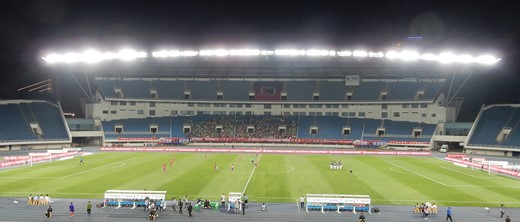
I managed to find my way into the West side, but most home fans were on the far side.
Before reaching the ground, as I had a Chinese friend guiding me, (even though he was not coming into the game), we bought a ticket from a “scalper”. The ticket did not show a price, but at 40 RMB, it was 10 RMB less that the face value at the ticket office. I was later told I was ripped off, and that I should have only paid about 30 RMB. Ticket scalping is a way of life in China, with the touts selling off the many unused complimentary tickets on offer. Apparently one should always pay less than the entrance price. I am told that this is the only way to get into the Workers’ stadium for Gou’an matches, unless you buy off the internet, as there is no ticket office at the stadium
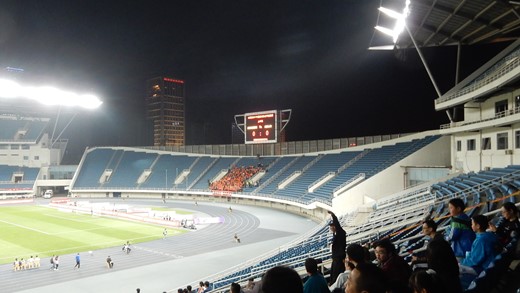
Meanwhile the visitors had their own section at one end.
The stadium I headed to is apparently called Olympic Sports Centre, and is actually the main stadium built for the 1990 Asian games. The best word to describe it would be “functional”. It is a simple bowl of a stadium with two tiers of seats along the sides, one behind each goal. The Asian games were held shortly before my first ever visit to China, and the signs of the changes in the country in the 27 years since are clear for all to see. For 1990, functional was the only way to build a stadium, no bells, whistles, and nothing spectacular. Less than half a mile way sits the “Bird’s Nest”. This and the stadium in Nanjing, along with a large portion of the new buildings in China are not merely functional, they also have the “wow factor”, curves, arches or intricate designs to make them stand out from the crowd.
Even more than the Super League match the night before, this game was a matter of passing to the foreigner and let them run with the ball. And therein lay the rub, which decided the game.
Beijing Renhe, the visitors started with three foreigners on the field, Ivo is a Brazilian who has been plying his trade in Asia for five years, firstly in Korea, and then in the China Super League before dropping a level. The Ecuadorian Jaime Ayovi has spent most of his time in Mexico, and has only switched to China this season. Ayub Masika is also new to China, he is Kenyan, but has been in Belgium since he was 13, and has played for Genk and Lierse in the top division there. By contrast, the home side started with just one foreign player, Cheick Tiote who is better known in Britain, having played 138 times for Newcastle United. It is not that they could not have fielded more, they also had Rubin Okotie – born in Pakistan with parents from Austria and Nigeria. Okotie is an Austrian international who has played in both Austrian and German Bundesliga. Okotie was on the bench. Their third foreigner was the Nigerian Leke James, who was playing in Norway before moving to China, but he was not in the day’s squad. They also had two Taiwanese players in the squad list, with one, Chen Hao Wei, an international for Taiwan on the bench. Under Chinese rules, players from Taiwan or the Special Administrative zones of Hong Kong and Macau who signed before a certain date are not counted towards the foreign players count, although new signings from these territories will.
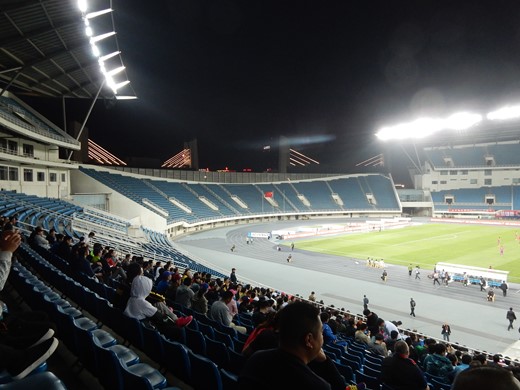
Ayovi was to score the first and last goals in the 4-0 away win, Ivo also was on the score sheet and Masika almost was as well. However his shot was blocked by the home keeper and bounced out allowing Shi Lian an easy stab into the net. The Renhe tactic was simple, with the two forwards being foreigners, and Masika on the right wing, they would boot the ball as close as they could get, and then let the trio play the ball amongst themselves. Beijing BG brought on Okotie at half time, and Chen Hao Wei midway through the second half. This made a difference, as in the last 20 minutes, they played some decent football and certainly were good enough now to stop the visitors from increasing the damage.
During the second half, I was talking to a New Zealand/British expatriate, who has been in China for some time, watching football there and in neighbouring countries. It was from him that I was explained the dealings with the scalpers. He also explained a little about the running of Chinese football. While the observations may differ from those that a Chinese official may give, one cannot help but believe that they have a ring of truth behind them. Firstly, consider the math. I was in Nanjing for the Jiangsu game, and the crowd was 30053. Ticket prices were between 100 and 200 RMB, so if we assumed everyone paid, (and we know that is not the case), then maybe the income from ticket sales was 150*30,000 = 4,500,000 RMB. Multiple it by 15 home games per season and we get to 67,500,000 RMB – less than £7 million. None of the clubs are taken much more from each game, the TV deals are not adding the sort of sums we see in the UK, and so the transfer fees and wages paid far exceed the incomes.
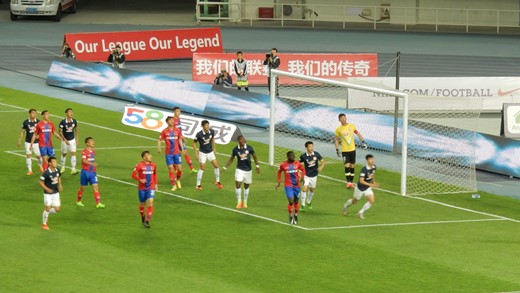
Looking up – the players cluster in the area as the corner flies over everyone’s head
Reports such as this one, [url]http://www.atimes.com/article/chinese-super-league-global-sports-star-heavy/[/url] indicate just how far the wages and transfer fees in Chinese football are slewed towards a few (almost all foreign players). In China, politics is everywhere, the big companies that are putting the money into the Chinese football clubs to pay to bring these foreign stars into the game are not doing so because it is fashionable, or because their owners just love football. They are doing it because the politicians that run the country currently think that football will be good for the country, and in return for supporting this aim, they will get their rewards. The buying into European football, another small dent in China’s massive budget surplus is also not just the play things of rich men, but backed by government policy. Only the slightly strange choice to buy into Midlands football, as opposed to other regions cannot be explained in this way.
President Xi has announced the football policy, that China should be capable of winning the World Cup by 2050. With no elections, China can afford to take the long-term approach, but patience will run out if they do not show improvement soon. It is easy to imagine that China will be bidding to stage the World Cup in 2030 or 2034, and they will expect to make a much better fist of it than the three defeats that they suffered in South Korea, their only appearance at the finals to date.
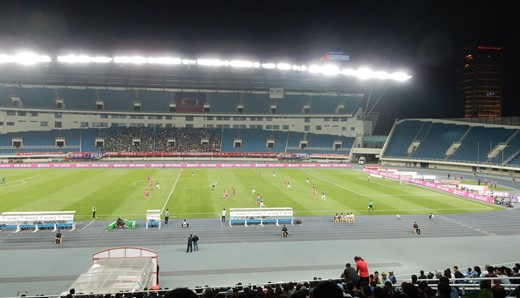
However, one does wonder about the logic they are employing. By all means, bring the stars into the Super League, get some publicity and raise the game at home. But China is a big country – the 16 Super League teams represent only 13 cities, and national TV coverage is limited. There is little publicity even for the second division, while the third level remains completely anonymous. China is a mobile phone happy country, with the (permitted) social media and internet news now far outstripping print media, but searches for lower division and amateur football, even using Chinese search engines provides little information. The level of football and fitness at Haikou was very poor for what purports to be a professional football team. If China is to up its game, it needs to overhaul its structure. Chinese footballers in China may earn only a little, compared to the foreigners, but it is still enough to keep them in China, rather than searching for opportunities further afield. Only one of the current international squad plays outwith the country’s borders.
It is a problem that China may well find it has in common with England, too much emphasis given to the elite squads, and enough cash to stop them expanding their horizons further afield, while the rest of the game is allowed to whither, (well, in China’s case, it has never grown in the first place). China needs a football coaching structure that extends to every province and city, to make sure that the talent is not lost. A more modest investment to bring in coaches from countries that do this well, (Germany and the Netherlands spring to mind), and greater emphasis on the whole game would in the long term boost the country’s talents, so as I could believe that they will not only